customs and border protection
Latest
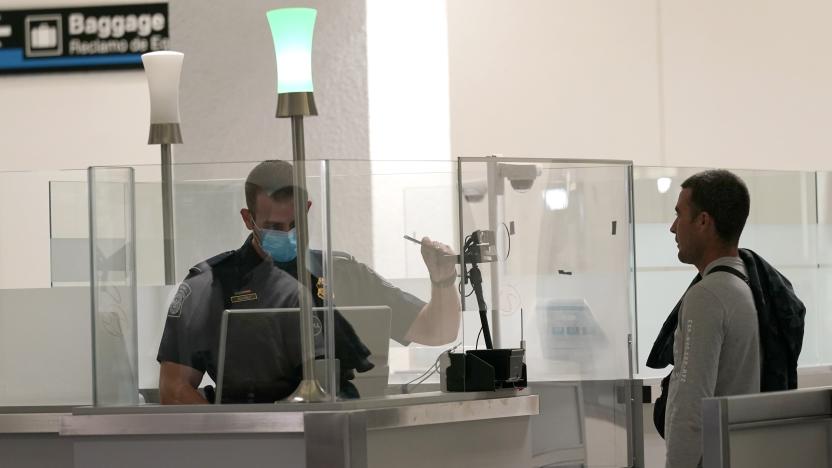
Civil rights groups demand CBP stops facial recognition expansion at airports
The ACLU, Electronic Frontier Foundation and others objected to a proposed rule change.
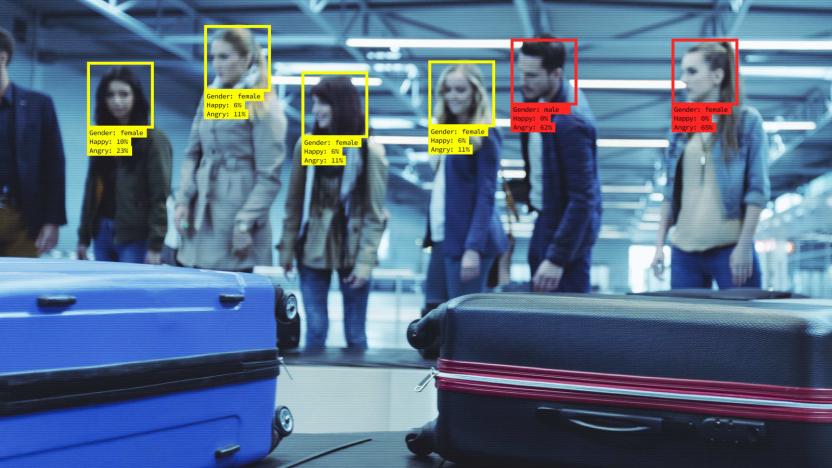
ACLU sues Homeland Security over airport facial recognition records
There's no question that AI surveillance is on the rise, but there are a lot of questions about just how extensively law enforcement agencies, like the Department of Homeland Security (DHS), are using it. In an attempt to increase transparency, the American Civil Liberties Union (ACLU) is suing DHS -- along with Customs and Border Protection (CBP), Immigration and Customs Enforcement (ICE) and the Transportation Security Administration (TSA). The ACLU is requesting records on the use of face surveillance at airports and borders, as well as the agencies' plans for future use.

Homeland Security doesn’t want Americans' airport face scans after all
Earlier this week, reports circulated that Homeland Security wanted to scan the faces of travelers, including US citizens, as they enter or leave the country. Naturally, critics raised concerns that the practice would violate citizens' privacy and that the "intrusive surveillance technology" could lead to abuses of power. Now, US Customs and Border Protection (CBP) says that it will allow US citizens to voluntarily participate in the program. In other words, US citizens can opt out.
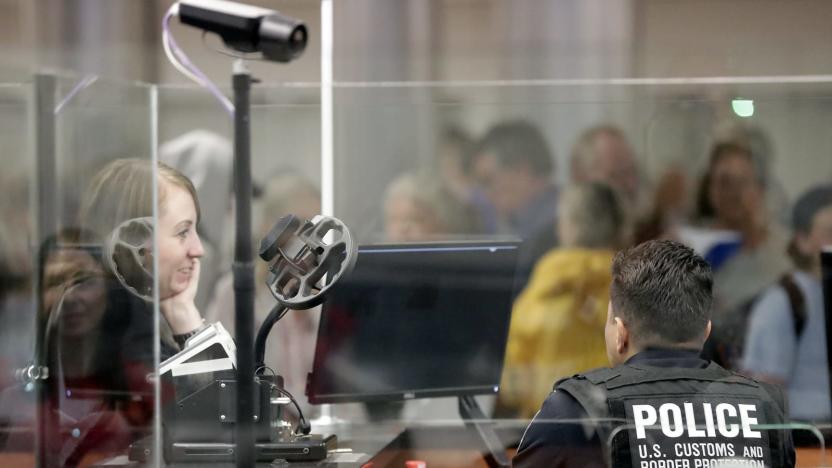
Federal judge rules suspicionless device searches at the border are illegal
Civil liberties advocates just scored an important victory in a bid to prevent arbitrary device searches at the US border. A federal court handling a 2017 lawsuit has ruled that US policies allowing device searches without valid suspicion or warrants violate Fourth Amendment protections against unreasonable searches and seizures. Judge Denise Casper noted that an exemption for searches at the border was "not limitless," and still needed to strike a balance between privacy and government interests. That usually means focusing on contraband, she said.

Harvard student deported based on friends' social media posts
If you thought the US' decision to screen social network posts for visa applicants risked giving innocent people the boot, you guessed correctly. US officials have deported new Harvard student Ismail Ajjawi not based on his own posts, but those on his friends list. While he said he avoided politics in his own posts, some of his contacts reportedly expressed "points of view that oppose the US." It didn't matter that he didn't interact with them -- Customs and Border Protection promptly cancelled his visa while he was still in the airport for questioning.
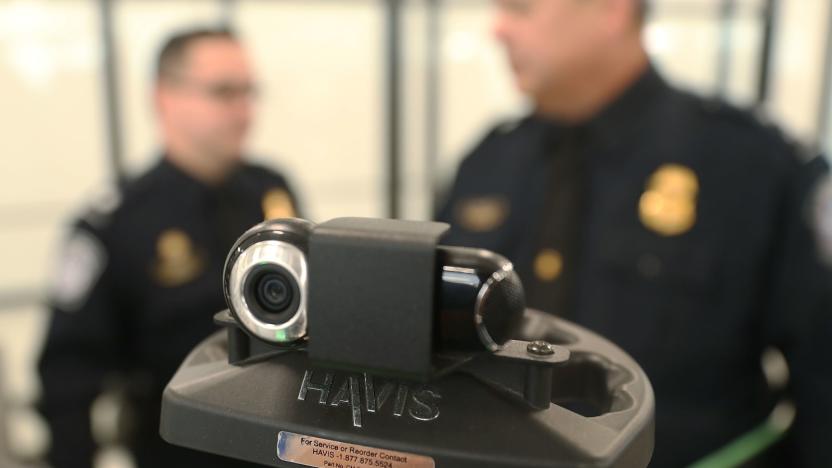
Hackers steal traveler photos and license plates from US Customs
If you were wondering why it can be risky for governments to collect traveler images en masse on connected systems... well, here's why. US Customs and Border Protection has confirmed that hackers stole traveler images from a subcontractor, including photos of people entering or leaving the country as well as copies of their license plates. In a statement, CBP said that the subcontractor had "violated mandatory security and privacy protocols" by transferring the data to its own network.

Senators propose legislation to protect your phone at the border
For years, US border agents have been demanding access to digital devices as people pass into and out of the country. The practice has raised red flags and lawsuits, and the number of searches has spiked under the Trump Administration. Last month, the ACLU charged federal agents with wielding "near-unfettered authority" to search phones, PCs and other devices. Yesterday, Senators Ron Wyden (D-OR) and Rand Paul (R-KY) introduced a bill that would require agents to obtain a warrant or written consent before they crack open digital devices and snag users' data.
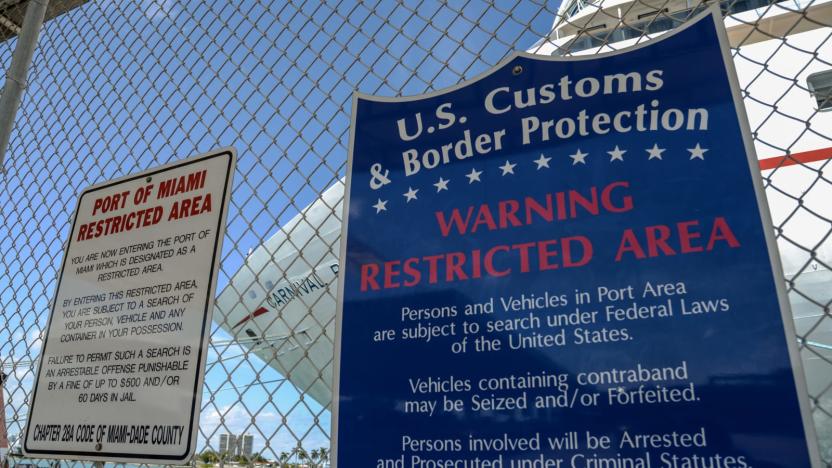
ACLU: border agents regularly perform 'warrantless' device searches
Privacy advocates have long been concerned that US border agents may be overstepping their boundaries when searching devices, and the ACLU just obtained evidence appearing to support that theory. The civil rights group has motioned for summary judgment in its lawsuit against the Department of Homeland Security after its discovery process revealed far-reaching policies for "warrantless and suspicionless" searches. Reportedly, both Customs and Border Protection as well as Immigration and Customs Enforcement have claimed "near-unfettered authority" to search phones, PCs and other devices, even though the requests fall well outside their purview.

$635,000 in bogus Lightning cables nabbed in Alaska
One of the functions of the US Customs and Border Protection agency is to seek out and seize counterfeited goods, and the Alaska Dispatch is reporting that the CBP nabbed more than US$635,000 in counterfeit Lightning cables and adapters during a search in Anchorage. The cables and adapters had come from China on a cargo plane, destined for spots around the US. The products came in boxes with fake Apple logos and Underwriters Laboratories (UL) trademarks, but spokesman Frank Falcon of the CBP reported that they "stood out" as counterfeits, packaged in cardboard packs that were of sub-standard quality. An unnamed Chinese manufacturing firm is responsible for the shipment, and Falcon noted that the seizure of the counterfeit goods will "bring more scrutiny" to future shipments from the company. There are safety concerns with such counterfeits, as unauthorized use of the UL logo could mean that the cables were never evaluated for electrical shock and fire hazards. There's also no way to be sure that the cables will even work. All of the items seized by the CBP will be destroyed. [via 9to5Mac]

Woman tries, fails to smuggle 44 iPhones into Israel
Sigh. We don't know whether to congratulate the enterprising spirit of this venture or to bemoan the sad state of a world where a 60-something-year old lady feels compelled to turn into an iPhone smuggler. Either way, Israel's Ben-Gurion International Airport has given us a pretty good reason for the use of full body scanners, which revealed the woman in question was strapped with 44 iPhone 4s all around her body. Dressed in traditional Georgian attire, the lady had some struggles walking around, which raised suspicion and got the officials to run her through the machines. Guess this gives us a whole new definition to the phrase "stocking stuffer," eh? [Original image credit: buystoreshelving.com]



